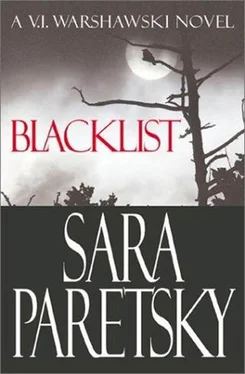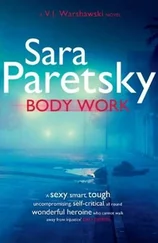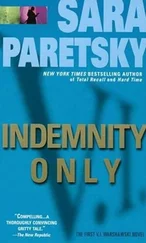When I reached him at home, he snarled, “If I’d wanted live patients paging me day and night, I wouldn’t have gone into pathology. I thought my home phone was unlisted, anyway.”
“Is it? You didn’t tell me that. Marc Whitby’s father wants a second autopsy performed on hi., son. Would you be willing to do that?”
He waited a minute to…;swer. “It’s something I do do, and can do, but it’s not something Cook County can pay for, Vic. And you know, if I do a thorough autopsy and simply-find that the guy drowned with alcohol in his system, the family may not accept those results.”
“What would you charge?”
“For the tox screens, and the time and space, it could go as high as three thousand.”
I had no idea what kind of resources the Whitbys had, but I told Vishnikov to proceed and asked how we should get the body to him.
It would help to have a third party, like a funeral director, do it, so I don’t have to step on Jerry Hastings’s toes by going to him direct. So, Vic,” he added, as I was preparing to hang up, “don’t go babbling about this to the press. It could be very hard on me politically to look as though I’m taking a public position against DuPage’s ME.”
“Someone’s going to have to know,” I objected, “unless you’re planning on stealing his body out of their morgue and doing this in your basement.” He burst out laughing. “You’re outrageous, Warshawski, making me sound like Burke and Hare. But I still don’t want this broadcast.”
“Copy that, Houston,” I said. “Your ass will be draped with the same discreet purple our government is using on the statues of justice.”
He laughed again and hung up.
While I’d been on the phone, Amy had been organizing papers. She’d cleared a space on Mary Louise’s desktop and had spread out the contents of my Larchmont file to study.
“You’re good,” she said, looking up at me. “You don’t bully unless it’s the only way, do you? What are you doing next? Want me to hold Mrs. Whitby’s hand while you move Marc’s body?”
“No. I want you to find out everything you can about Kylie Ballantine.” She opened her eyes wide at me. “Whatever for-oh. You think that’s why Marc went out to this mansion? Why?”
I grimaced. “I don’t know, that’s why. But I only have a couple of starting points. He’s been thinking about her day and night for months, he’s writing a book about her-and all his files have disappeared.”
I pulled the printout on Ballantine that Aretha Cummings had given me yesterday from my briefcase and handed it to Amy Blount. I’d read it before I went to bed-I summarized the high points for Blount.
Kylie Ballantine had been both a dancer and an anthropologist. She’d been trained in classical ballet, but she’d gone to Africa to study tribal dance in French Equatorial Africa (modern-day Cameroon and Gabon, I was guessing). On her return she’d started the Ballet Noir, a deliberate pun on Diaghilev’s Ballets Russes, incorporating African dance into classical ballet, using costumes and masks from Africa. With the Negro Theater Project money, she’d done an ambitious ballet called Regeneration, which depicted an African-American sense of awakening and self-respect as people reclaimed their African heritage.
“It’d be great to see that,” Blount commented. “There probably aren’t films of it, though. What did she do after the theater project lost its funding?” “She went back to Africa, I think.” I thumbed through the printout. “I know she wrote a couple of books on tribal dance, and taught briefly at the University of Chicago.”
“That must have been something special,” Blount said dryly. “Black woman at that school in the forties or fifties. No wonder she took early retirement.” She took the printout from me to examine Whitby’s brief paragraph on that part of Ballantine’s life. “It looks like Marc was really only interested in her dance career. And then-I see. She ran a private dance studio from her home in Bronzeville until she died in ‘seventy-nine. Okay. I’ll see what else I can figure out. What are you going to do?”
“Go back to his house and canvass the neighbors. It occurred to me, private as he was, there might have been a lover in the picture you and Harriet never heard about. The kids on that block see everything. Someone had to notice something about him.”
Amy looked at me speculatively from under her thick lashes. “You know, I’m second to none as a researcher, and I’d be glad to go on-line, or down to the Vivian Harsh Collection. But I’m wondering if I wouldn’t be more effective on that street than you.”
I felt my cheeks grow hot, but I remembered the cautious response I’d already received this morning. The kids might talk to me as readily as to a black woman, but the adults were more likely to be open with Amy.
“Point taken. Do you have a cell phone?” We exchanged mobile numbers. “I’m not sure what I can pay you for this-I hadn’t factored that into the estimate I gave Harriet for taking the case. But your help will make a big difference, and I don’t expect you to donate it.”
She shook her head. “It feels good to be doing something. Even after Marc moved here, I didn’t know him all that well, but Harry-Harrietis like my own sister. Doing something active to track down what happened to Marc, it’s the one thing I can do for her. You don’t need to be paying me.”
Timmy’s in the Well
We spent some time on-line, me looking for the Negro Theater Project, Amy checking the trains to the western suburbs. Marc could have caught a nine-thirty, which would have set him down in the station nearest to New Solway at ten-twenty. He still would have been miles from Larchmont Hall. One of us would have to fit in time to hunt down any suburban cabs or buses that might have picked him up. I ground my teeth at that prospect.
When the Web yielded only two meager references to the Negro Theater Project and none at all to Kylie Ballantine, I drove the fifteen miles south to look at real documents in the Vivian Harsh Collection.
Amy took off for Bronzeville when I left for the library. She’d described the Harsh Collection before we separated. Harsh, who’d been the first African-American to head a branch of the library, had been a private collector of material on black writers and artists. When she died, she donated everything-photos, documents, booksto the city. The Harsh Collection was the best of its kind in America, next to one in Harlem.
To my surprise, the papers were housed in a room off a major library branch-I’d pictured the collection in its own building. The library itself was doing a bustling business, mostly with women bringing their young children in to look at books, but also the usual collection of homeless and elderly that a library gathers. It’s a respectable destination. It’s warm, you can be with other people. All reasons why the Web cannot take the place of your branch library. Also it had books. And an archivist who knew and loved his collection.
At first, Gideon Reed frowned over my request. Yes, he knew those papers well, but why did I want to see them?
“I know Marcus Whitby’s been looking at them for some time,” I said. “That’s why I’m here.”
When I explained my role in Whitby’s death-finding him, working for the familyand showed him my ID, the archivist unbent. Mr. Whitby had been a real scholar. They didn’t get many here, mostly students working on term papers just wanting a few facts about Martin Luther King, not that he didn’t love showing young people how to use books and documents, but there was something satisfying about seeing this collection in the hands of someone who truly appreciated it.
Читать дальше












